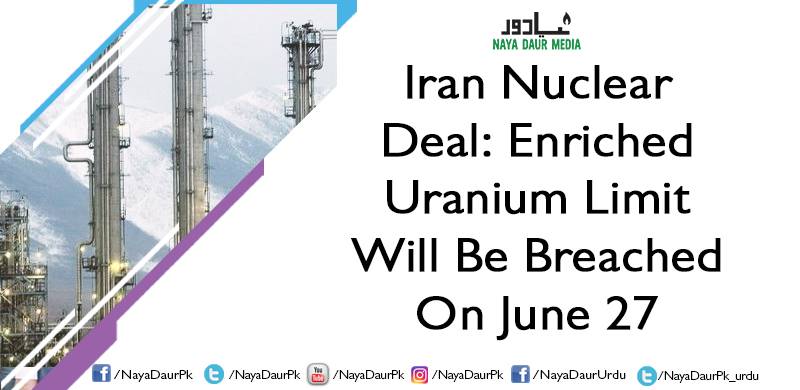
Iran has announced that it will breach the limit on its stockpile of enriched uranium, set under a 2015 nuclear deal with world powers, on June 27.
Its atomic energy agency said Iran had quadrupled its production of the material, which is used to make reactor fuel and potentially nuclear weapons.
But it added there was "still time" for European countries to act by protecting Iran from reinstated US sanctions.
The UK, France and Germany have warned Iran not to violate the deal. They have said they will have no choice but to reimpose their own sanctions, which were lifted in return for limits on the Iranian nuclear programme, reported BBC.
Iran has complained that they have failed to abide by their commitments to mitigate the effects of the US sanctions that took effect after President Donald Trump abandoned the deal last year.
This latest development comes at a time of high tension in the region, with the US deploying military reinforcements and accusing Iran of being behind suspected attacks that left two oil tankers ablaze on Thursday. Iran denies any involvement.
In early May, Trump stepped up pressure on Iran by ending exemptions from US secondary sanctions for countries still buying Iranian oil. The move was intended to deny the Iranian government its principal source of revenue.
Iranian President Hassan Rouhani subsequently announced that his country was scaling back its commitments under the nuclear deal.
This included no longer complying with caps on its stockpiles of low-enriched uranium and heavy water - set at 300kg and 130 tonnes respectively - and halting sales of surplus supplies overseas.
Rouhani also gave the European powers 60 days to protect Iranian oil sales. If they failed, he said, Iran would suspend its restrictions on uranium enrichment and halt the redesign of its heavy-water reactor at Arak, whose spent fuel would contain plutonium suitable for a bomb.
On Monday, a spokesman for the Atomic Energy Organization of Iran told a televised news conference at Arak that the "countdown to pass the 300kg reserve of enriched uranium has started".
"This is based on Articles 26 and 36 of the [nuclear deal], and will be reversed once other parties live up to their commitments," he added, referring to clauses setting out how Iran and other state parties will respond to violations.
"There is still time for the Europeans... But the Europeans have expressed indirectly their inability to act. They should not think that after 60 days, they will have another 60-day opportunity."
Kamalvandi also said Iran might start enriching uranium up to 5% or 20% concentration so that it could provide fuel for the Bushehr power plant and the Tehran research reactor. The nuclear deal permits enrichment only up to 3.67%, while "weapons-grade" uranium is 90% enriched.
Its atomic energy agency said Iran had quadrupled its production of the material, which is used to make reactor fuel and potentially nuclear weapons.
But it added there was "still time" for European countries to act by protecting Iran from reinstated US sanctions.
The UK, France and Germany have warned Iran not to violate the deal. They have said they will have no choice but to reimpose their own sanctions, which were lifted in return for limits on the Iranian nuclear programme, reported BBC.
Iran has complained that they have failed to abide by their commitments to mitigate the effects of the US sanctions that took effect after President Donald Trump abandoned the deal last year.
This latest development comes at a time of high tension in the region, with the US deploying military reinforcements and accusing Iran of being behind suspected attacks that left two oil tankers ablaze on Thursday. Iran denies any involvement.
In early May, Trump stepped up pressure on Iran by ending exemptions from US secondary sanctions for countries still buying Iranian oil. The move was intended to deny the Iranian government its principal source of revenue.
Iranian President Hassan Rouhani subsequently announced that his country was scaling back its commitments under the nuclear deal.
This included no longer complying with caps on its stockpiles of low-enriched uranium and heavy water - set at 300kg and 130 tonnes respectively - and halting sales of surplus supplies overseas.
Rouhani also gave the European powers 60 days to protect Iranian oil sales. If they failed, he said, Iran would suspend its restrictions on uranium enrichment and halt the redesign of its heavy-water reactor at Arak, whose spent fuel would contain plutonium suitable for a bomb.
On Monday, a spokesman for the Atomic Energy Organization of Iran told a televised news conference at Arak that the "countdown to pass the 300kg reserve of enriched uranium has started".
"This is based on Articles 26 and 36 of the [nuclear deal], and will be reversed once other parties live up to their commitments," he added, referring to clauses setting out how Iran and other state parties will respond to violations.
"There is still time for the Europeans... But the Europeans have expressed indirectly their inability to act. They should not think that after 60 days, they will have another 60-day opportunity."
Kamalvandi also said Iran might start enriching uranium up to 5% or 20% concentration so that it could provide fuel for the Bushehr power plant and the Tehran research reactor. The nuclear deal permits enrichment only up to 3.67%, while "weapons-grade" uranium is 90% enriched.
